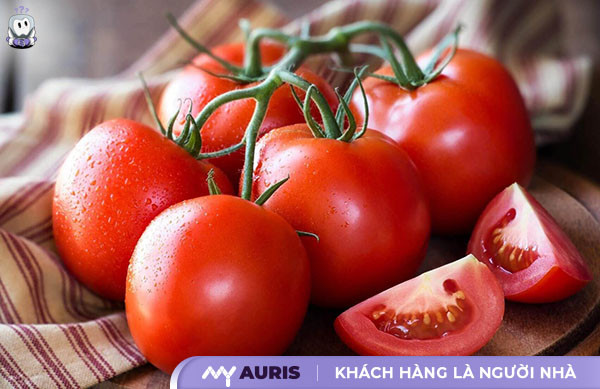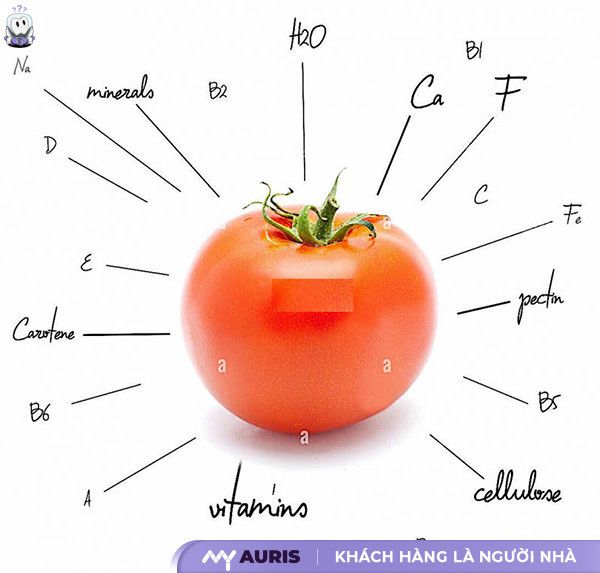Tomatoes, a powerful “ally” for your weight loss journey thanks to their rich content of antioxidants and abundant nutrients. Not only do they support weight management, but this superfood also slows down aging, contributes to preventing cancer and stroke. Furthermore, tomatoes are known for their ability to stabilize blood pressure, protect cardiovascular health, and enhance overall well-being. Add tomatoes to your daily diet to enjoy these wonderful benefits!
How many calories are in tomatoes?
100g of tomatoes contains only about 18 calories, an incredibly ideal number for those monitoring their weight. With a water content of up to 95%, tomatoes not only help quench thirst but also provide many essential nutrients for the body.
The balance of these nutrients makes tomatoes an excellent choice for a healthy diet. Adding tomatoes to your daily menu not only helps control weight due to their low-calorie content but also provides numerous health benefits thanks to their rich content of vitamins, minerals, and antioxidants. From boosting the immune system and protecting cardiovascular health to improving skin, tomatoes are truly an easy-to-find, easy-to-prepare “superfood” suitable for all ages.

Nutritional composition of tomatoes
A ripe, vibrant red tomato contains up to 95% water, which helps the body stay hydrated and supports metabolism. The remaining 5% is a harmonious blend of carbohydrates and fiber, providing energy and aiding the digestive system.
Specifically, 100g of raw tomatoes contains:
- Calories: 18
- Water: 95%
- Protein: 0.9g
- Carbs: 3.9g (approximately 4% of weight), primarily simple sugars (glucose and fructose – accounting for nearly 70% of total carbs) at 2.6g.
- Fiber: 1.2g, mainly insoluble fiber (87%) including hemicellulose, cellulose, and lignin, which helps improve bowel function.
- Fat: 0.2g
Tomatoes are a rich source of vitamin C, a powerful antioxidant that helps protect the body from harmful free radicals. A medium-sized tomato can provide approximately 28% of the recommended daily intake (RDI) of vitamin C. Additionally, tomatoes contain potassium, an essential mineral that helps control blood pressure and reduces the risk of heart disease.
Vitamin K1 (also known as phylloquinone) is also present in tomatoes, playing a crucial role in blood clotting and maintaining bone health, preventing osteoporosis.

Do tomatoes help with weight loss?
Tomatoes are a food recommended for many diet plans due to their high water content and abundant fiber. These are two important factors that help the body feel full longer, curb cravings, and support effective weight loss.
Cherry tomatoes, in particular, are an ideal choice as they can be eaten raw directly or incorporated into refreshing, easy-to-eat, low-calorie salads. However, experts recommend using ripe tomatoes for safety. Eating unripe (green) tomatoes can cause poisoning and seriously affect health due to their solanine content – a natural toxin.

Outstanding health benefits of tomatoes
Tomatoes are a food source rich in lycopene and antioxidants, helping to protect the body against many harmful agents. Not only easy to add to the diet, but tomatoes also offer many health care values:
Healthy skin care
Lycopene in tomatoes acts as a protective layer for the skin against the effects of ultraviolet rays. As a result, the skin avoids the risk of melasma, sunburn, freckles, and maintains long-lasting youthfulness and health.
Effective cancer prevention
Numerous medical studies show that lycopene has the ability to slow the growth of cancer cells, especially prostate, colorectal, and stomach cancers. The antioxidants in tomatoes help the body reduce the risk of dangerous cancers.
Bone health support
The calcium and vitamin K content in tomatoes plays an essential role in maintaining the structure and restoring bone tissues, helping to prevent osteoporosis in older adults.
Cardiovascular health protection
Tomatoes provide B vitamins and potassium, which help regulate blood pressure and lower blood cholesterol, thereby supporting the prevention of common cardiovascular diseases such as stroke or atherosclerosis.
Good for eyes, enhancing vision
Thanks to their vitamin A content, tomatoes help improve eye structure and support night vision, which is especially beneficial for the elderly or those with impaired vision due to nutrient deficiency.
Tomatoes are generally safe and cause few side effects. However, some individuals with sensitivities to pollen or latex may experience allergic reactions when consuming tomatoes. Therefore, it’s advisable to start with a small amount to test your body’s reaction. If no unusual signs are noted, you can increase the serving size according to your daily nutritional needs.





